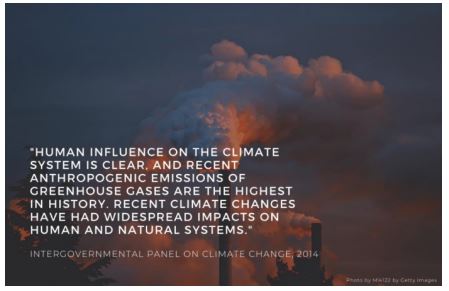Global and National Climate Change
Since the late 1800s, the Earth’s temperature has risen by 1°C largely due to human activities (IPCC, 2014). As fossil fuels continue to be burned around the world, the warming is accelerating faster than before. Earth’s average surface temperature in 2018 was the fourth hottest year on record since record-keeping began in the 1880s (NASA, 2019). As of 2019, the five warmest recorded years have occurred during the past five years, and the 20 warmest years on record have occurred over the past 22 years (NASA, 2019).
Since 1950, the overland temperature in Canada has increased by 1.5°C. This rate of warming is almost double the global average reported over the same period. The years 2011 and 2012 were 1.5°C and 1.9°C warmer than the 1961-1990 average in Canada, with 2016 now standing as the warmest year on record globally. Canada has also become wetter during the past half century, with average precipitation across the country increasing by approximately 13%. We have also seen more frequent and intense extreme events over the last 50-60 years than ever before. These events come in the form of extreme heat days, more instances of extreme precipitation and flooding, wind storms, and ice storms. In Canada, models show shorter return periods of extreme events into the future (McBean and Henstra, 2009).
Climate Science
The UN Intergovernmental Panel on Climate Change (IPCC) is the UN body tasked with assessing the science related to climate change, its impacts and potential future risks, and possible response options. In its Fifth Assessment report, the IPCC declared with certainty the widespread impact of human-caused climatic changes. The report stated: “Human influence on the climate system is clear, and recent anthropogenic emissions of greenhouse gases are the highest in history. Recent climate changes have had widespread impacts on human and natural systems” (IPCC, 2014).

At the 2015 United Nations Climate Change Conference (COP 21), 195 countries including Canada reached the Paris Agreement, an attempt to limit the global average temperature rise to “well below” 2°C from preindustrial levels, and pursue efforts to limit the increase to 1.5°C. According to the IPCC, the 1°C of warming already experienced will have a long-lasting consequences for human and natural systems, and limiting global warming to 1.5°C (as opposed to 2°C) would allow more time to adapt to climatic changes such as sea level rise and ocean acidification (IPCC, 2018).